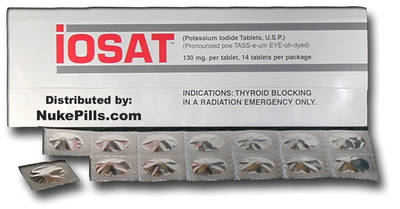Potassium Iodide is a Popular Pill
Amid heightened awareness in light of the nuclear-plant disaster in Japan, Americans are clamoring for potassium iodide pills. Store shelves are empty in some areas, and many online suppliers have been out of stock since Day 2.
After days of 'round-the-clock media coverage of the health implications of radiation exposure, the U.S. public has rapidly become aware that potassium iodide (chemical name -- KI) works best if taken within 3 to 4 hours of exposure. They want to beat the rush in case of fallout from Japan or any other radiation emergency strikes the U.S.
The panic buying goes on despite authorities' declarations that anti-radiation tablets provide protection only for those very close to a nuclear event and for a maximum of 24 hours.
 |
Photo credit: nukepills.com (WikiCommons). This potassium iodide product is currently out of stock at nukepills.com. |
Because KI pills are available over the counter, jittery patients may turn to them without doctors' knowledge.On its "Bioterrorism and Drug Preparedness" webpage (apparently written for decidedly UNnatural disasters), the FDA has a concise FAQ about consumers and KI.
How does potassium iodide work?
The FDA explains: "KI floods the thyroid with non-radioactive iodine and prevents the uptake of the radioactive molecules, which are subsequently excreted in the urine." It does not work against substance other than radioactive iodine.
But not everyone should take potassium iodide.
People with documented iodine sensitivity should avoid it, as "as should individuals with dermatitis herpetiformis and hypocomplementemic vasculitis, extremely rare conditions associated with an increased risk of iodine hypersensitivity." If KI use is prolonged beyond a few days, patients with thyroid-related conditions "should be treated with caution," the FDA says.
The FDA provides information on dosing and puts the caveats in perspective, saying: " As a rule, the risk of thyroidal side effects is related to dose and to the presence of underlying thyroid disease (e.g., goiter, thyroiditis, Graves').
"...We recognize that the exigencies of any particular emergency situation may mandate deviations from those recommendations. With that in mind, it should be understood that as a general rule, the risks of KI are far outweighed by the benefits with regard to prevention of thyroid cancer in susceptible individuals."
For heavier reading, check out the government's full guidance on Potassium Iodide as a Thyroid Blocking Agent in Radiation Emergencies.
---Lori B. Farmer




